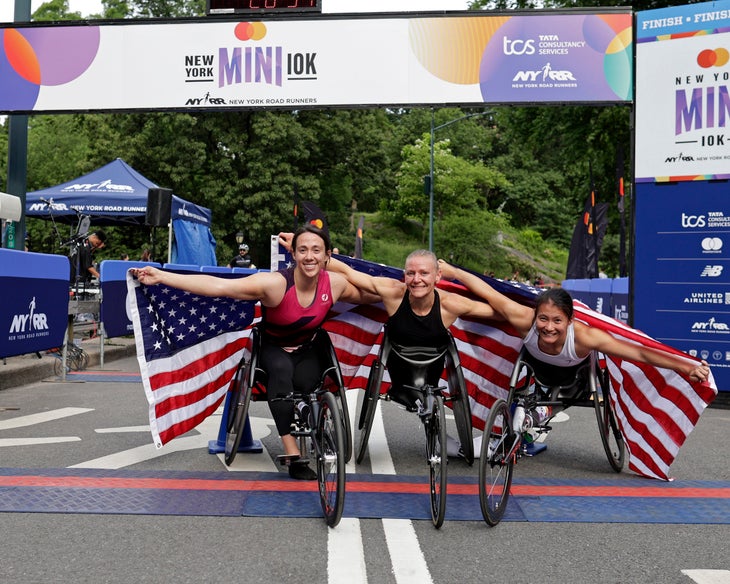Products You May Like
Get access to everything we publish when you
sign up for Outside+.
In 1972, the New York Mini 10K became the world’s first and original female-only event. This year on June 11, 9,000 runners celebrated the 50th anniversary of the NYRR Mini 10K in historic fashion in a race stacked with Olympic champions, American record holders, and Paralympians.
In a stacked field, Senbere Teferi came out on top, followed closely by Sharon Lokedi of Kenya. Keira D’Amato rounded out the top three with a time of 31:03, an American women’s-only record for the 10K on the road.
Others in the field included Peres Jepchirchir (Kenya), defending New York City, Boston, and Olympic marathon champion; Sara Hall (USA), two-time defending Mini 10K champion; Emily Sisson (USA), Olympian and American half marathon record holder; Aliphine Tuliamuk (USA), Olympian and 11-time national champion.
Teferi was not in first place for the entire 6.2 miles, but she was consistently in the lead pack. Through the first half of the race, that group consisted of 10 women running and working together. But as the race continued and runners began to tire, the leaders slowly dwindled down.
By mile 4, the top group included seven: Caroline Rotich (Kenya), Lokedi, Viola Cheptoo (Kenya), Teferi, Tuliamuk, D’Amato and Jepchirchir.
“My plan was to keep running with them as long as I could,” said Teferi, who did just that.
At around 4.5 miles, Teferi surged on an uphill. As she did, Jepchirchir accidentally stepped on Teferi’s heel, causing Jepchirchir to tumble to the ground. Only Lokedi and Tuliamuk remained with Teferi.
With several miles left and her eyes on the finish line, Teferi continued pushing the pace, putting more and more distance between herself and her competition. Looking strong and showing no signs of fatigue, it seemed she was chasing down the course record, just as she had done in March’s New York half.
Although she was unable to break the Mini 10K record of 30:28 set by Asmae Leghzaoui (Morocco) in 2002, Teferi won. She finished in 30:43, her second win in New York City this year.
“Yes, in New York I’ve been coming here, and I’ve been winning. Praise God. I’m very happy to have won here,” said Teferi, who secured $10,000 in prize money with her first-place finish.
Lokedi finished next in 30:52. And after a surge during the last mile, D’Amato finished in third in 31:03, narrowly overtaking Tuliamuk, who ran in 31:08.
RELATED: For Keira D’Amato, “Running Isn’t About Fast” (Most of the Time)
Jepchirchir finished in the top five in 31:19, despite her mid-race stumble. Americans Emily Sisson and Sara Hall both finished in the top 10, in seventh and ninth place respectively.
History was made in the professional wheelchair division with three-time defending Mini 10K champion Susannah Scaroni setting a new world record and course record of 21:10. Scaroni led the pack for the race, with the second-place finisher, Jenna Fesemyer, over three minutes behind her in 24:34. It was a sprint to the finish for third place, with Hannah Dederick narrowly beating Yen Hoang.

“The New York Mini 10K is a special one to me for so many reasons, and I’m excited at the chance to race on what will be a milestone day for women’s running in Central Park,” Scaroni said prior to the race. “Not only is the Mini 10K the world’s original women-only road race, but it is also one of the only women-only wheelchair races at the present time, which will hopefully pave the way for future generations of women’s wheelchair racers in the next 50 years.”
RELATED: Age is Just a Number: Why Elite Women Over 35 are Crushing It
The NYRR Mini 10K was originally called the Crazylegs Mini Marathon, named after a shaving gel marketed toward women. The race’s goal was simple: to get more women into the sport of running. And the 10K distance was thought to be the perfect place to start. It worked.
The race has grown from 72 finishers in 1972 to 200,000 total finishers to date. Former NYRR President Fred Lebow later changed the race’s name to the Mini 10K, in homage to the miniskirt, which was wildly popular in the 1970s.
To commemorate the impact of the race and celebrate the 50th anniversary, several women from the initial 1972 race, as well as notable female finishers from past races competed. They included Deena Kastor, who won the 2004 Mini 10K, as well as Kathrine Switzer and Lynn Blackstone, who both participated in the 1972 Mini 10K.
